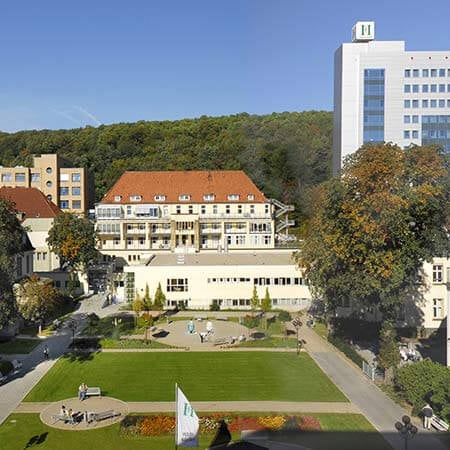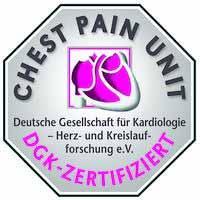Long QT syndrome is an increase in the length of the QT interval on the cardiogram, which is characterized by a tendency to develop ventricular arrhythmias. They can lead to fainting, cardiac arrest, or sudden cardiac death. The disease is congenital – it is associated with genetic mutations. Patients require lifelong treatment with beta blockers. Some of them require surgical treatment – left cervicothoracic sympathectomy, pacemaker and implantable cardioverter defibrillator placement.
Content
- Causes
- Why is the syndrome dangerous?
- Treatment
- Surgical treatment
- How to get treatment in the world's leading hospitals
Causes
If the myocardial excitability is uneven, the QT interval on the ECG becomes longer. Repolarization is asynchronous, so it takes longer.
A prolonged QT interval can be a consequence of various diseases, including congenital ones. The primary syndrome occurs due to inherited gene mutations, while the secondary lengthening of the QT interval may be associated with the following:
- Taking medications.
- Electrolyte imbalance (insufficient levels of potassium and magnesium in the blood).
- Hypothermia.
- Hypothyroidism (decreased thyroid function).
- Heart disease (myocardial infarction, heart defects and abnormalities).
Why is the syndrome dangerous?
Long QT syndrome leads to ventricular tachycardia (increased heart rate). It can cause ventricular fibrillation, which is a life-threatening condition that manifests itself in very rapid ventricular contractions.
The incidence of primary (congenital) long QT interval syndrome is 1 case per 10 thousand. In the United States, 4 thousand people die because of this condition every year. These are mainly young people or children. 70% of them at the time of death already experienced symptoms associated with long QT interval syndrome. In 30%, death occurs during the first episode of syncope (loss of consciousness). This happens most often during stress, exercise, or sleep.
If the patients who have cardiac arrest survive, they may develop neurological deficits. It is associated with a violation of the blood supply to the brain – while the heart is not working, the brain does not receive oxygen, which leads to its damage.
The syndrome is 2 times more common in women. Mortality under 10 years of age is higher in boys. After 10 years, the risk is the same for both sexes.
Diagnosis
Most cases of long QT syndrome are diagnosed after a person experiences fainting or cardiac arrest. Less commonly, the diagnosis is made after an ECG.
The main way to confirm the diagnosis is ECG. To calculate the corrected interval, Bazett's formula is used. Additional diagnostic methods help exclude other cardiac pathologies: doctors perform echocardiography, MRI, and functional tests. The type of syndrome is determined by genetic tests.
Treatment
The main group of drugs for the treatment of long QT syndrome are beta blockers. They prevent up to 70% of cardiovascular events. Basically, the risk of death during exercise is reduced, but not reduced during sleep and at rest.
All patients are recommended to limit intense exertion, stressful situations, and participation in sports events. The patients who have LQT1 should avoid swimming.
With LQT3, exercise rarely causes life-threatening arrhythmias. The patients are not restricted in physical activity. Beta blockers are less effective in this group of patients. Therefore, they are often used in combination with sodium channel blockers.
In patients with long QT syndrome, epinephrine and sympathomimetic agents are not used to treat bronchial asthma. They are contraindicated in many other drugs that can provoke arrhythmia: antibiotics, antihistamines, antifungal, psychotropic and other drugs.
Recommendations apply not only to those with syncope, but also to asymptomatic patients. Even accidentally diagnosed long QT syndrome is a reason for life-long prescription of beta blockers.
Surgical treatment
Surgical treatment options:
- Installation of an implantable cardioverter defibrillator.
- Installation of a pacemaker (rarely used without the implantable cardioverter defibrillator).
- Left cervicothoracic sympathectomy.
Indications for installing pacemaker and implantable cardioverter defibrillator:
- A history of cardiac arrest.
- Continuing fainting during therapy with beta blockers.
- High risk of cardiovascular events (type of LQT2 or LQT3 syndrome, the length of the QT interval is more than 500 ms).
The installation of pacemakers and implantable cardioverter defibrillators reduces the risk of death by more than 10 times in high-risk patients.
In patients with recurrent arrhythmias due to drug treatment, another treatment option can be used: sympathectomy. This is an operation, the essence of which is the surgical resection of the lower third of the third left cervical sympathetic ganglion, its aortic branch and thoracic sympathetic ganglia at the level of the second to fourth thoracic vertebrae on the left. The operation is performed without opening the chest. After it, the sympathetic innervation of the heart decreases, so the risk of life-threatening arrhythmias decreases.
This technique is more effective for LQT1 syndrome. In other variants of the disease, it is inferior in the effectiveness of implantation of a pacemaker and cardioverter defibrillator.
In children and adolescents, a combination of two techniques is possible. The first one is sympathectomy followed by the placement of the implantable cardioverter defibrillator. Previous surgery reduces the rate at which the device is triggered and improves the quality of life for patients.
How to get treatment in the world's leading hospitals
You can get diagnostics and treatment of long QT syndrome abroad. The Booking Health specialists will select a specialized cardiac surgery hospital for you and organize your trip. Booking Health is a medical tourism provider that has been organizing the treatment of patients from 75 countries in the world's leading hospitals for more than 10 years.
Both doctors and patient case managers working at Booking Health undergo regular training to gain new medical knowledge and provide effective medical and organizational assistance. Booking Health offers the following benefits for you:
- Selection of a specialized hospital with high treatment success rates.
- Direct communication with your attending physician.
- Preliminary preparation of the medical program, without repeating previous diagnostic examinations.
- Provision of a favorable cost of treatment, without extra charges and additional coefficients for foreigners (saving up to 50%).
- Doctor's appointment on the most suitable dates.
- Independent control of the medical care program at all its stages.
- Assistance in buying and forwarding medicines.
- Communication with the hospital after the completion of treatment.
- Control of invoices and return of unspent funds.
- Organization of additional diagnostic examinations or rehabilitation (if necessary).
- Top-class service: booking hotels, plane tickets, transfers.
- Interpreting services and assistance of a personal medical coordinator.
Please leave your request on the Booking Health website, and a medical advisor or a patient case manager will contact you on the same day.
Authors:
This article was edited by medical experts, board-certified doctors Dr. Nadezhda Ivanisova, and Dr. Bohdan Mykhalniuk. For the treatment of the conditions referred to in the article, you must consult a doctor; the information in the article is not intended for self-medication!
Our editorial policy, which details our commitment to accuracy and transparency, is available here. Click this link to review our policies.















